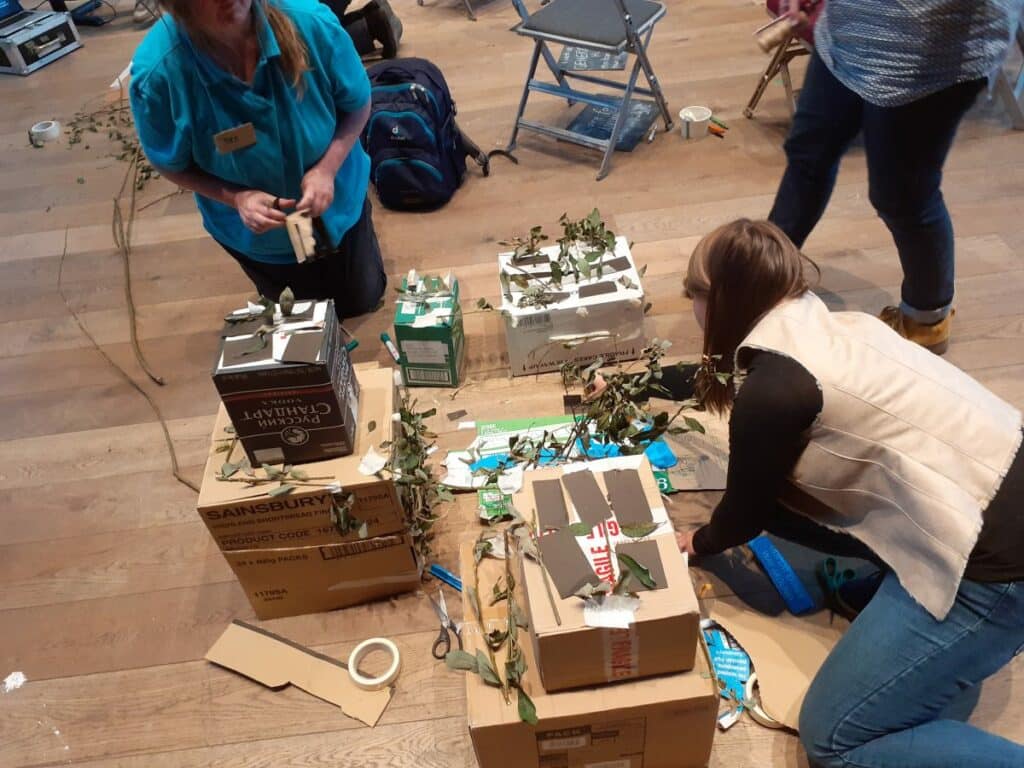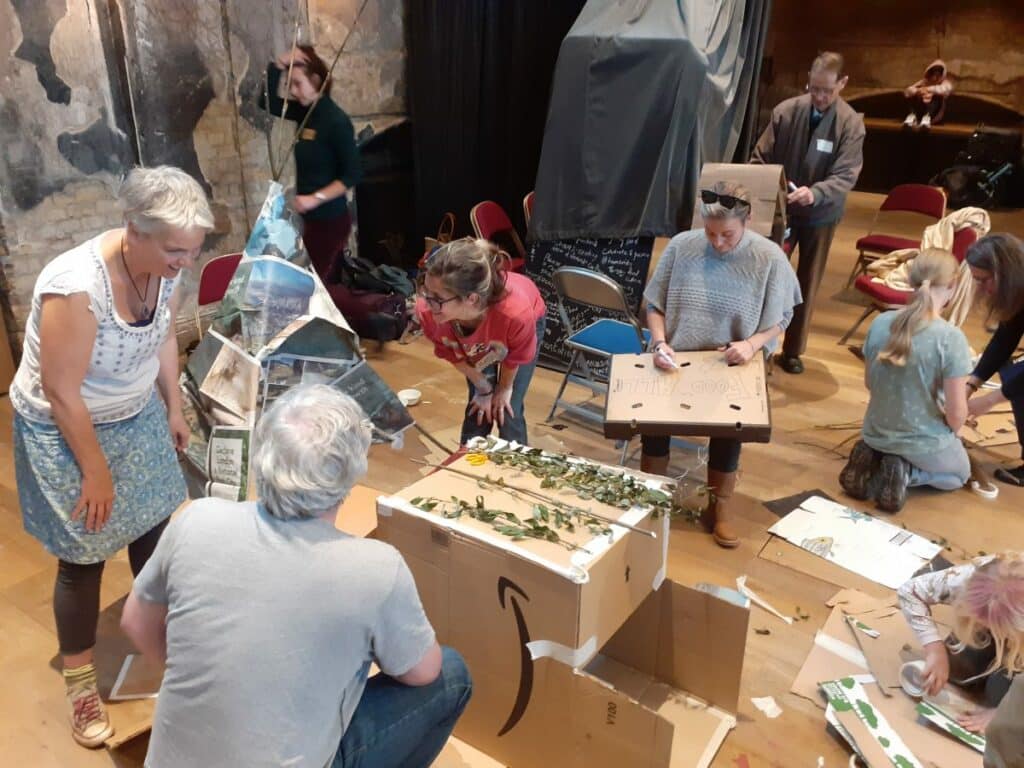Transition Town Tooting: Pop Up Tomorrow
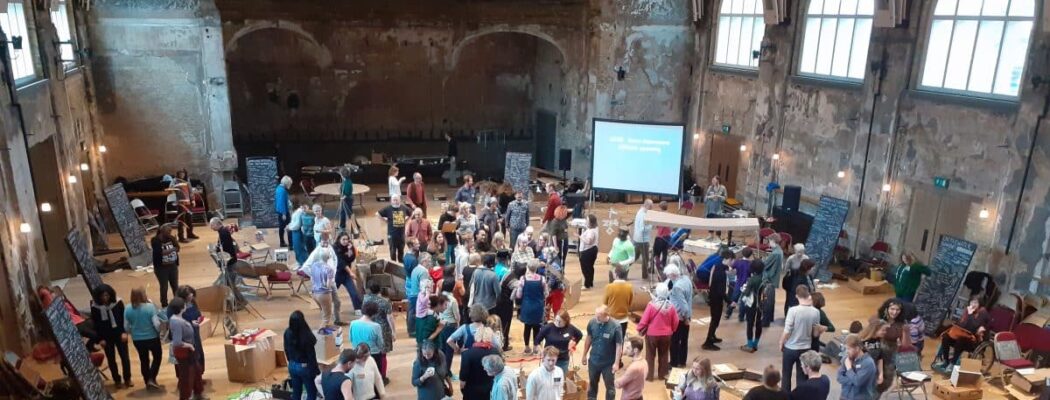
Established in 2008, Transition Town Tooting (TTT) is a local community group that aims to respond to the complex challenges of our times (climate change, loss of biodiversity, social injustice, inequity and other impacts of the global growth economy). Their many community-led projects are focused on living more sustainably, exploring possibilities of a healthy, just and resilient future and a positive vision of abundance.
Here, we look back at ‘Pop Up Tomorrow’, an event that took place in late 2019 yet remains as topical and pertinent as ever, because its message – envisioning and planning for an alternative, fairer tomorrow – never gets old.
Described as an opportunity ‘to explore our longings for what we want the future to be, connecting us with each other and a future worth fighting for’, ‘Pop Up Tomorrow’ took place in Battersea Arts Centre’s Grand Hall on 20 October 2019. Hosted by Ruth Ben Tovim and Lucy Neal from participatory arts organisation Encounters Arts, almost 200 people attended, having accepted the invitation to vision and enact a new tomorrow.
The day began with participants filing silently into a small strip of the spectacular Grand Hall, which was partitioned by a red ribbon that ran across the width of the room. They were invited to look forward, beyond the ribbon, into the rest of the hall. “That is 2030”, they were told. In that space beyond, separated by the red line of the present, anything is possible. The participants were going to create a 2030 that would be ‘the result of our doing everything we could possibly have done’.
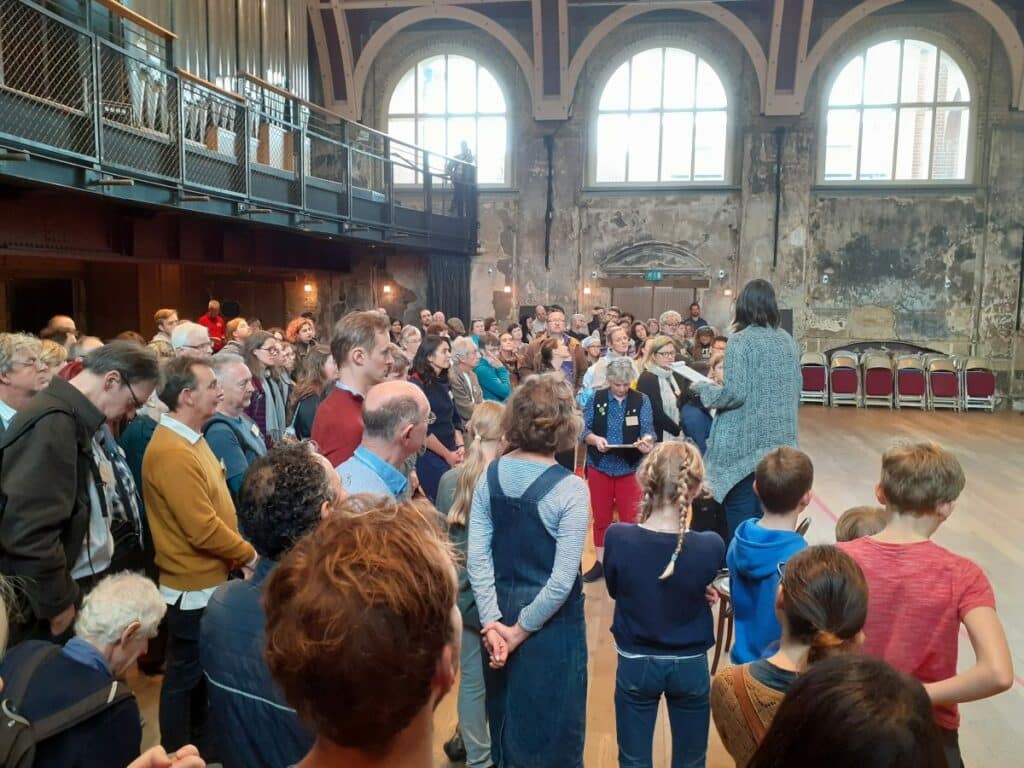
The ribbon was lowered, and the group spread into the rest of the space, finding their place in the future. Participant Nick Anim recalls this moment: “Admittedly, from a perspective of realism wrapped in self-consciousness, this process initially felt a bit strange; we were, after all, being asked to consciously uncouple ourselves from the here and now, allow ourselves to dream a little, imagine a lot. Contrary to my intuitive and perhaps somewhat institutionalised reservations, this simple process was surprisingly liberating”.
Participants were invited to reflect on one thing they cherish in their lives, and then shared stories in response to what other people had written. These stories were recounted back to the rest of the group, in turn becoming shared narratives. Then, forming groups of 8, they discussed how they might live together as a ‘street’ in 2030, and how they might use their knowledge and skills to contribute to their future community.
Participant Sarah McAdam reflected: “I live in a pretty anonymous London flat amongst a pretty transient population – as soon as I get to know my neighbours, they move on. In this imaginary 2030, I found that I was imagining myself wanting and needing to share much more with my neighbours – to grow things with them, eat together at least some of the time and share appliances, tools and services. I could feel how much it mattered that they were people I could get along with and who would bring skills and energy to what we were doing together. It really helped that we started by telling each other a little about what we each loved and valued.”
Around the room large blackboards were headed with the following topics:
- Food (growing, sourcing, selling, cooking, sharing)
- Goods and services (sourcing, selling, sharing)
- Energy, water, transport infrastructure
- Community finance (money as flow and exchange)
- Green, blue, public and play spaces, connectivity (transport)
- Communications, civic networks
- Formal and informal learning (Education, skills)
- Celebrating, rituals, ceremonies
- Creativity, design and making
- Health, caring, well-being
- Governance, law, justice and community decision-making.
The attendees wrote on the boards the key things their imaginary ‘Town Centre Anywhere’ would need. Each person chose the topic they would most like to contribute to, and new “committee” groups were formed. They swiftly set about designing a project for their town.
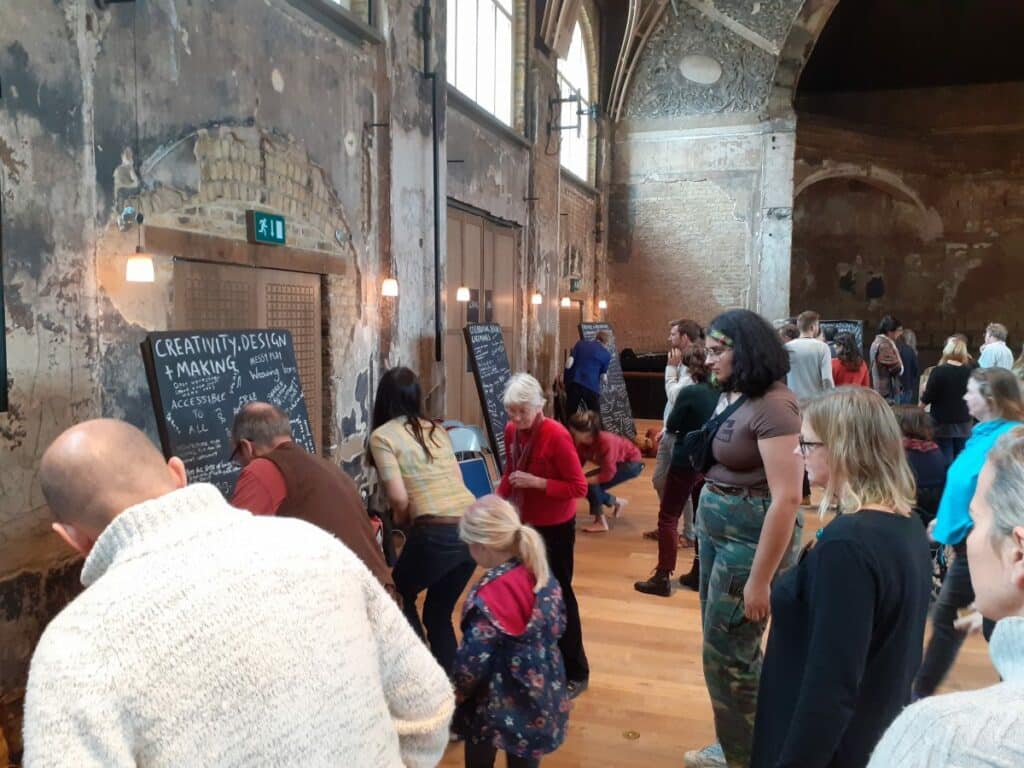
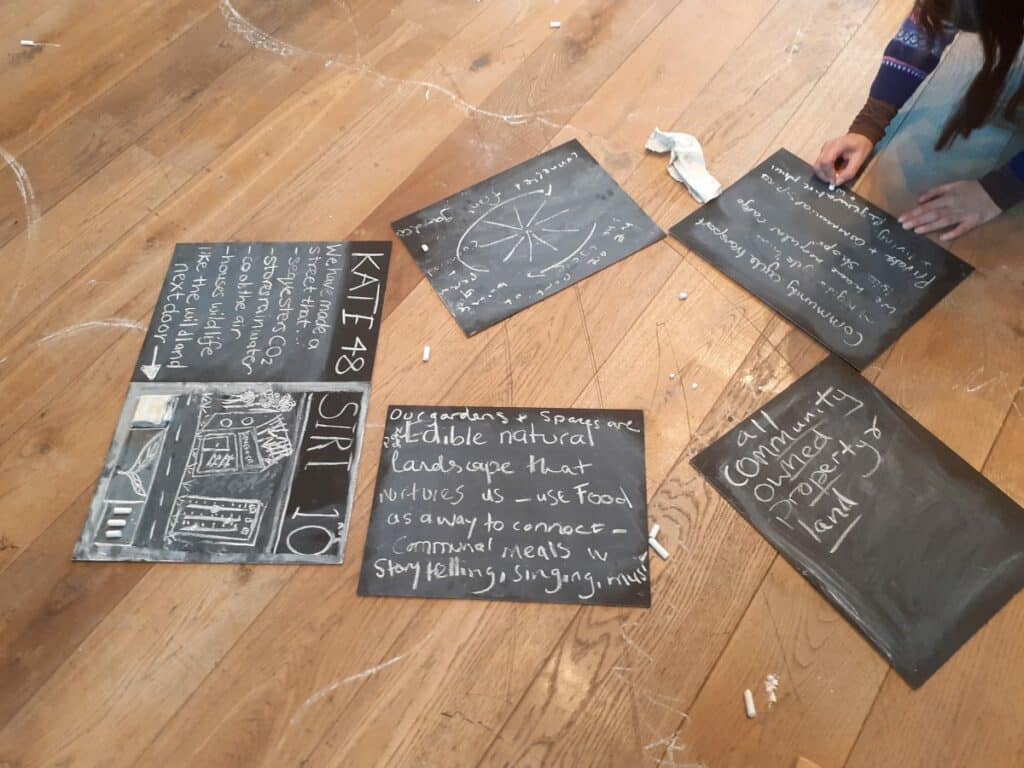
“I joined a group working under the theme of ‘Communications and Civic Networks’. We identified a deficiency of listening in the world of 2019 we had left behind, and decided to build ‘The Listening Bridge’ that would help different communities come together regularly to discuss any issues of concern. Listening to, and recognising the concerns of different, often marginalised, groups within any community is key to its sustainability and the flourishing and harmony of society at large,” said Nick Anim.
The visions then came to life when the groups built their projects in 3D using cardboard, willow from a local Wandsworth park, string, tape, pens, etc. Once the town was built, its “Mayor” (a randomly chosen participant) declared it open.
Collectively, the participants had designed a high street of the future that was entirely centred on the community’s well-being, a town that had been modelled by care of people, place and planet.
“Wandering around, I felt really inspired by the other groups and their ideas. Some of the constructions were great (the tram, the community energy) but even more so some of the groups that had formed, around listening, skills sharing, and justice. It felt like a positive, thoughtful, gentle place to live,” said Greta Hughson.
Eventually the group had to return to their current reality and bid farewell to the town they had created. They returned once again behind the ribbon, that thin red line of the present moment, back to the side of looking forward into a future that could be possible.
‘Pop Up Tomorrow’ is a perfect example of the power of play. As Rob Hopkins, co-founder of Transition Network, put it: such experiences give people “a deep, rich, multi-sensory imaginary picture of how the future could be, one that will hopefully be able to nudge in front of dystopias, pessimism, despair and resignation.” After the pandemic crisis, such radical reimagining and creativity is more potent and more vital than ever. We should all remember that tomorrow does not have to be business as usual.
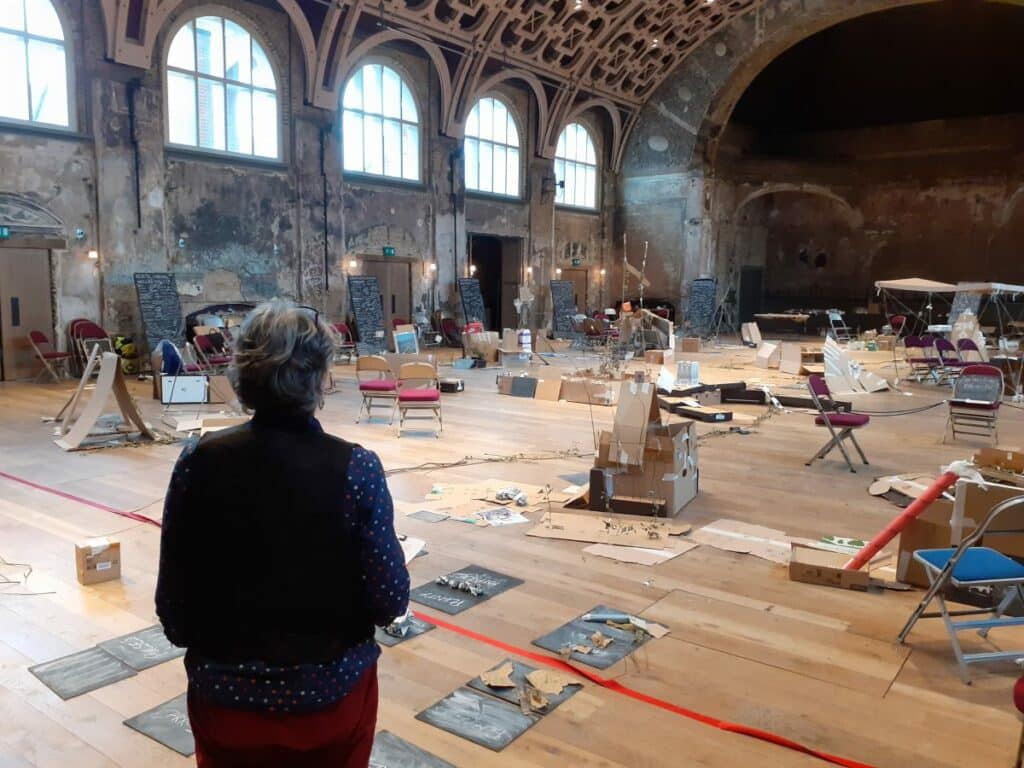
Transition Town Tooting (TTT) is an arm of the Transition Network, a movement of about 350 local groups internationally, who are looking together at a positive response to climate change and resource depletion. Read more about TTT’s aims and principles here.


